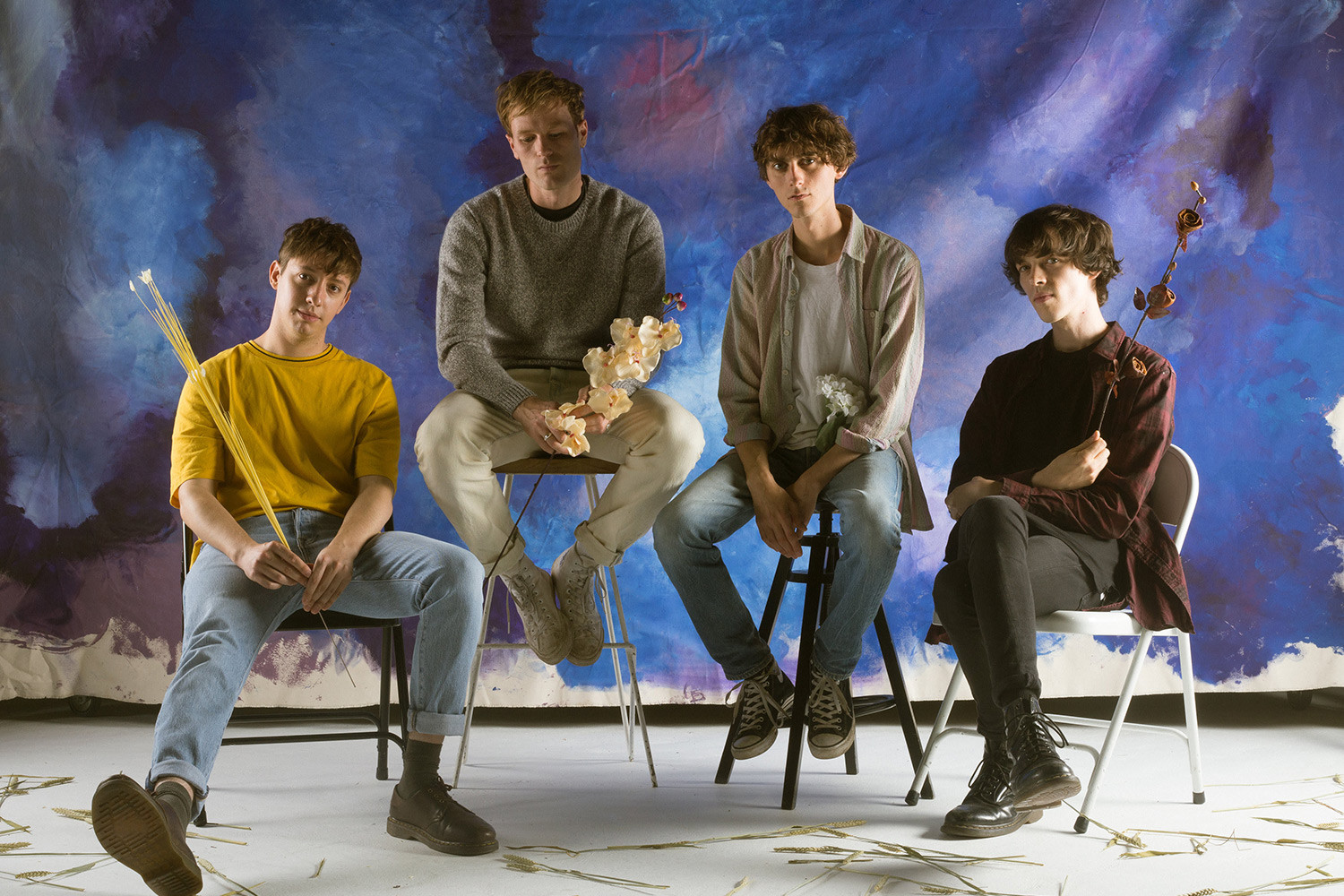When they dropped their debut album back in 2015, Gengahr marked themselves out as one of the most interesting, exciting, essential bands in a pack of vibrant British talent. Now, as 2018 spins around, and that same gang grows and pushes the boundaries even further towards the big leagues, they’re ready to follow it up.
After two years, Gengahr are back with the follow up to 2015 debut, ‘A Dream Outside’. ‘Where Wildness Grows’ was created in a way that would break some bands, but for this four-piece, it’s made them even more brilliant.
“’A Dream Outside’ was a closed-door scenario,” explains frontman Felix Bushe. “There was no external force having any influence on what we were doing. Half that album was recorded before we had a label or even management, there was a naivety and charm about that where we didn’t really have any great ambitions for it, we just wanted to go do songs ourselves. Since then, we’ve taken two years to get another album together, which probably isn’t that abnormal, but it does feel like a long time for the band.”
He continues: “We went from touring for a year and a half to having a year where we didn’t play shows and just wrote and recorded. It’s a really strange change of pace from the whirlwind that happened after making the first album, having to stop and gather your thoughts again and think about what you want to do the next time around. You don’t want to repeat yourself in any way; you want to feel like you’re moving forward. There was a lot of deliberating initially, what would be the appropriate way to move on. One of the things we had was that we would be well up for collaborating a little bit more with an external party, if they had any ideas that they could bring, [but] the way things worked out proved more difficult than we initially thought.”
After going through a handful of producers and continuous dissatisfaction and disappointment, the band finally found common ground with Neil Comber. “We stepped in with Neil, and he seemed like the perfect person to freshen things up, with his energy and personality, [it] breeds enthusiasm and fills the room with a warm, good vibe. After [the initial process] and spending so much time on [the songs], it was necessary to go forward and have that enthusiasm injected into it again. We did write a bunch of new songs, and it’s not the same album we recorded the first time around. There are songs in there that have been reimagined, [and] there was an essence of the skeleton of the first album, [but] it was a case of trying to find someone to help us flesh it out again. I think Neil did a really good job with that, and we were very pleased he took on the responsibility of that.”
[sc name=”pull” text=”There’s so much bullshit that goes with trying to make an album”]
“There was a lot of stuff going on during the process,” Felix considers. “I had the unfortunate event that my mum got really ill during the process, and she ended up passing away while we were making the album. I think for me emotionally; I was slightly drained a lot of the time, it was hard to place yourself in the right mindset. Things took longer than they would have for a combination of reasons, but at the end of the day, the most important thing is you have to be confident in the songs you’ve written; the song is king at the end of it. You can produce something like a sketchy demo or a full blown huge production piece, and both of them are rubbish if the song is not good. I think that’s where you have to place your faith.”
“There are so many ups and downs [being in a band], it’s a rollercoaster ride,” he continues. “Every time something great happens, something really shitty happens. I think that’s the reality that bands have to live with. Like you’ll sign a record deal, and perhaps you might end up getting dropped. They’re the big extremes of what happens, but you can go from feeling totally elated, and the world is yours to conquer, and then feeling like you mean absolutely nothing, whatever you do no one’s going to care. You’re always teetering on the edge of unpredictability, and I think that can be really scary for bands.
“What happens after doing one album, is you become aware of these pitfalls, but you’ve got to try and focus on the music. There’s so much other bullshit that goes with trying to make an album; it’s crazy the nonsense that you have to go through just to put an album out and get someone to help you with that endeavour. It’s so far from simple when you walk into it, and we had this ambition to be a band from such a young age, you kind of go in a bit blind to all the other stuff that happens around that. Ultimately, you become sort of savvier and more aware of what it is you want to get out of it. Do you want to make albums? Do you want to be famous? Do you want to be rich? For us, we want to make albums, we want to do a lot of albums, and to do that, you’ve got to jump through hoops, and that’s sometimes pretty frustrating.”
‘Where Wildness Grows’ sees Gengahr move out of their comfort zone and explore a plethora of new sounds. Their distinct vibe is still there, but there’s some new ethereal wizardry thrown into the mix. “We’ve always seen ourselves as a band that can sort of mix it up, and I don’t think we wanted to be restricted to one particular thing. We didn’t want to keep things too lo-fi, or grunge, or pop. We wanted to be able to do whatever we want, and it still work. That was one of the most challenging things about making the album, trying to play as a different band every now and again, and still trying to feel like it is Gengahr. I think potentially, some of the songs can feel completely sonically unrelated, but hopefully what ties them together is the fact that it is that band, and it’s the same lyricist and singer, and same drummer and bass player. These are the connecting factors, not the genre necessarily, and I think it’s just a case of trying to keep things interesting. You’re trying to write a long piece of music which is close to an hour in length, and it would be pretty repetitive if it were the same thing every time. The most disappointing albums for me are the ones where there’s the one song that nailed it, and then there are nine versions of it that aren’t as good.
“The first album was more of an escapist piece in many ways, a lot of it is coated in metaphors, and you try and push yourself out of the limelight, and you don’t want things to be directly linked back to you. On this album it’s a lot more honest, it became a lot more unavoidable to include myself more in the songs, and be a bit more open about how I felt. It feels like a step forward, and a bit more personal and intimate than the first one.”
[sc name=”pull” text=”It feels like a step forward”]
2018 definitely holds bright things for the band. “I’m looking forward to going out again and playing shows and festivals. I hope we won’t have any sort of short hiatus like we did between these two albums, I think we have a better idea of how to move forward perhaps, and what we want to sound like and where we want to sit. Discovering your own identity is quite a struggle for bands, without doing anything too crazy but still feeling like it’s still fresh and exciting for you. We’re always looking to stay writing and keep having things to share; it’s so important, it’s part of the process. My biggest regret for the first album was not really taking that pause; I was enjoying touring so much and being on the road, that I didn’t really think about the second album until we stopped and I was like, ‘Oh shit we should probably work this out’.
“I’m happy we actually managed to finish [the album], and have everyone happy at the end. You have four musicians, four songwriters working together, and I think trying to keep everyone happy is very difficult, and coming up to the end of the recording process and having everyone have a smile on their face is the biggest achievement you can have. It’s a juggling act in a sense, it’s a relief to have the album finished, it’s a satisfying feeling, and it’s going to take a little while for us to go through that process again. When you go through a very thorough creative process, you’re not managing your own expectations, you’re trying to accommodate everyone around you, and these are people that you trust and have faith in, and they’re essentially your best friends. It takes an element of work, and it leaves you at the end knowing that what you’ve done is right.”
Taken from the December 2017 / January 2018 issue of Dork, out now. Order a copy here.





